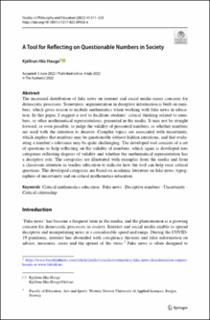A Tool for Reflecting on Questionable Numbers in Society
Peer reviewed, Journal article
Published version

Åpne
Permanent lenke
https://hdl.handle.net/11250/3055060Utgivelsesdato
2022Metadata
Vis full innførselSamlinger
Sammendrag
The increased distribution of fake news on internet and social media raises concerns for democratic processes. Sometimes, argumentation in deceptive information is built on numbers, which gives reason to include mathematics when working with fake news in education. In this paper, I suggest a tool to facilitate students’ critical thinking related to numbers, or other mathematical representations, presented in the media. It may not be straight forward, or even possible, to judge the validity of presented numbers, or whether numbers are used with the intention to deceive. Complex topics are associated with uncertainty, which implies that numbers may be questionable without hidden intentions, and that evaluating a number’s relevance may be quite challenging. The developed tool consists of a set of questions to help reflecting on the validity of numbers, which again is developed into categories reflecting degrees of validity and whether the mathematical representation has a deceptive role. The categories are illustrated with examples from the media and from a classroom situation in teacher education to indicate how the tool can help raise critical questions. The developed categories are based on academic literature on fake news, typographies of uncertainty and on critical mathematics education.
